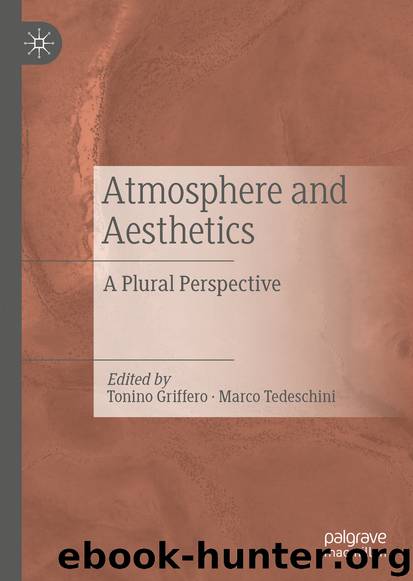Atmosphere and Aesthetics by Unknown

Author:Unknown
Language: eng
Format: epub
ISBN: 9783030249427
Publisher: Springer International Publishing
3 Staging Law
There is little doubt that from a phenomenological point of view, law stages the world for us. We are the prized audience for such a staging, the honoured guest but also, and this is where the phenomenological illusion comes in, the ones who can change that if they so wished. We are the subjects in a world full of objects waiting to be apprehended. Our dispositifs of visibility, one of them also law, encourage and reinforce this unidirectionality. What is more, the connection between us and the world, as mediated by legal intentionality, retains the illusion of control. This is a human gaze after all and can be differently directed.11
Yet, with the move from aesthetics to aestheses, such anthropocentric illusions can no longer be easily entertained. Law is not only staging the world for us as a neoliberal horizon. Rather, law is staging itself in a neoliberal way, largely relying on the illusion of contractual freedom “if you do not like it, you can always say no”. By staging itself as contractual, law meddles not just with the phenomenological mediation between subjects and world, but with the very ontology of the world and the taken-for-granted category of subjects. Law staging itself means that the world becomes absorbed in law’s representation of the world: the only possible world is the one offered by the staged law. This is not simply a question of a phenomenological perspective on the world that can change if the subject, in whose perception the world also falls, changes. On the contrary, this is an intervention on the level of ontology: by staging itself, law alters not just the representation of the world but the world itself. And because law is no longer a priori thought but only situationally, it can import nothing of its supposed ideals of equity, fairness and justice in that staging, unless of course this is what is needed in that particular staging.
In most cases, however, what is ‘needed’ is a perpetuation of the neoliberal model. This is what Böhme calls aesthetic economics (Böhme 1995), namely the way in which commodities are staged: “to increase their exchange value, commodities are now presented in a special way, they are given a look, they are aestheticized and are put on show in the exchange sphere… to the extent that use is now made of their attractiveness, their glow, their atmosphere: they themselves contribute to the staging, the dressing up and enhancement of life” (Böhme 2016, 20). Just like other commodities, law is packaged in order to become attractive, to the point that its ‘staging value’ (Böhme 2016, 68) becomes much more important than its initial commodity exchange value. Law stages itself through media, both traditional and social, by becoming spectacular, twitter-based and responsive to social pressures, sacrificing its supposed myth of neutrality for another myth, that of popular value. It stages itself in support of traditional and conservative regimes of property, and aesthetically sides with the old ‘art canon’ of high art, while failing to recognise street art as art (Young 2013; Finchett-Maddock forthcoming).
Download
This site does not store any files on its server. We only index and link to content provided by other sites. Please contact the content providers to delete copyright contents if any and email us, we'll remove relevant links or contents immediately.
Kathy Andrews Collection by Kathy Andrews(11831)
The remains of the day by Kazuo Ishiguro(8999)
Spare by Prince Harry The Duke of Sussex(5197)
Paper Towns by Green John(5191)
The Body: A Guide for Occupants by Bill Bryson(5096)
Industrial Automation from Scratch: A hands-on guide to using sensors, actuators, PLCs, HMIs, and SCADA to automate industrial processes by Olushola Akande(5061)
Machine Learning at Scale with H2O by Gregory Keys | David Whiting(4313)
Be in a Treehouse by Pete Nelson(4051)
Never by Ken Follett(3956)
Harry Potter and the Goblet Of Fire by J.K. Rowling(3857)
Goodbye Paradise(3810)
The Remains of the Day by Kazuo Ishiguro(3413)
Into Thin Air by Jon Krakauer(3399)
Fairy Tale by Stephen King(3396)
The Cellar by Natasha Preston(3344)
The Genius of Japanese Carpentry by Azby Brown(3309)
120 Days of Sodom by Marquis de Sade(3275)
Reminders of Him: A Novel by Colleen Hoover(3116)
Drawing Shortcuts: Developing Quick Drawing Skills Using Today's Technology by Leggitt Jim(3080)
